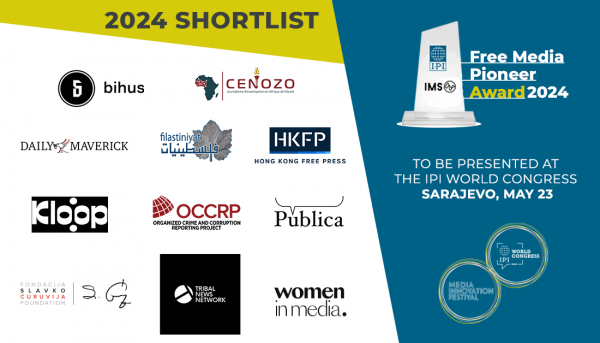H.E. Donald H. Rumsfeld
Secretary of Defense
Office of the Secretary of Defense
1000 Defense Pentagon
Washington, DC 20301-1000
USA
Fax: +1-703-697 83 39
Vienna, 16 December 2005
Dear Mr. Secretary,
The International Press Institute (IPI), the global network of editors, leading journalists and media executives, is writing to express its concern at recent articles in the world’s media showing that the Pentagon is hiring third parties to place positive stories about the war in Iraq in the country’s newspapers.
According to an article in the Los Angeles Times dated 30 November and titled, “The Conflict in Iraq; U.S. Military Covertly Pays to Run Stories in Iraqi Press,” the U.S military is writing pro-American articles, translating them into Arabic, and having them published in newspapers in Iraq’s capital, Baghdad.
While the articles are largely factual, the Los Angeles Times reports, “They present only one side of events or omit information that might reflect poorly on the United States (U.S.) or Iraqi governments, officials said.”
In order to distance itself from the operation, the Pentagon has a contractual arrangement with a firm based in Washington called the Lincoln Group, which assists in the translation of the articles and their placement. The relationship between the Pentagon and the Lincoln Group is part of an ongoing psychological and information operations campaign that uses information dissemination to further U.S. military objectives in Iraq.
The Los Angeles Times’ article suggests that a number of Iraqi newspapers have been involved in this practice. Some newspapers, such as Al Mutamar, published the stories as news articles while others labelled the story “advertising” without informing readers that the stories originated with the U.S. military. Based on documents the Los Angeles Times discovered, newspapers received financial inducements to run the stories.
For a 6 August story in Al Mutamar, titled, “Iraqis Insist on Living Despite Terrorism, the newspaper was paid US$50, while close to US$1,500 was paid to Addustour in a 2 August article titled, “More Money Goes to Iraq’s Development.”
The Pentagon’s decision to disseminate information in this manner is reminiscent of its initiative, shortly after the September 11, 2001, terrorist attacks, to create an Office of Strategic Influence (OSI) that would develop news stories containing disinformation for foreign media organisations.
After growing concern at the proposals, on 26 February 2002, the Pentagon decided to close down the OSI. However, based on the events of recent weeks, it appears that instead of centralising such initiatives, and housing them under a specific body, the Pentagon has merely dispersed them to various parts of the military establishment in the hope that they would evade the American media’s notice.
When examining the decision to revive the OSI initiative, IPI believes that the use of such methods will cause great harm to the Iraqi media environment, as well as to the credibility and reputation of the U.S. Moreover, if left unchecked, it might also have a detrimental impact on the political and media institutions within the U.S. itself.
The nascent Iraqi media need to be given clear guidance on ethical standards of conduct; instead, rather than receiving this support, journalists and editors have been co-opted by financial inducements, while, at the same time, the U.S. administration has profited by claiming that a free media is evidence of emerging democracy in Iraq.
Such activities also run the risk of creating a culture, among the Iraqi media, that believes it is perfectly acceptable to receive money in return for press coverage. If this were to happen, then all the good work of press freedom and other democracy-building organisations in Iraq, who have sought to introduce higher standards, would be undone.
Although the Pentagon is forbidden by law to use such methods against the American media, the existence of the Internet means it is inevitable that such stories will find there way into the American media and the public’s consciousness. In consequence, the Pentagon is not only risking the credibility of the Iraqi media, but also that of the American media.
IPI is also deeply worried at the message communicated by these actions. The reduction of the Iraqi media to purely a delivery mechanism for information is a severe corruption of the media’s Watch Dog role. There is a considerable danger that, by harming the credibility of the Iraqi media and, by virtue of “blowback” the American media, the Pentagon will also do harm to political institutions within the United States.
By undermining the media in this manner, the Pentagon is not only increasing the public’s distrust of journalism, but also those who most rely on it, namely politicians. Increased distrust in the various institutions will lead to increased cynicism making it more difficult for those who appear in the media to be believed. As a consequence, there is a possibility that the standing of important institutions within the United States will be weakened and future administrations will find it more difficult to engage with the public.
With the above in mind, we urge you in the strongest possible terms to halt the practice of interfering with foreign media in this manner and to allow democracy-building organisations to continue with their work of improving standards in the Iraqi media without fear that the Pentagon is compromising this important work.
We thank you for your attention.
Yours sincerely,
Johann P. Fritz
Director


